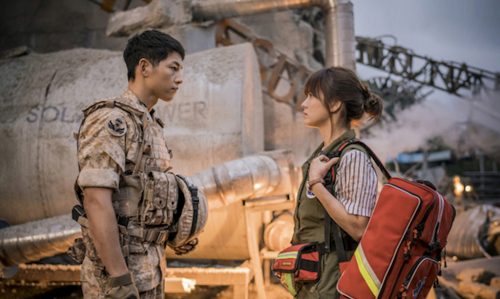K-drama review: Descendants of the Sun

I know, it’s barely two weeks since my last K-drama review and this show is 16 hours long. No wonder I haven’t read much. My excuses are twofold: I was a bit brain foggy and I found this series addictive. From the first episode of Descendants of the Sun (KBS 2016), I knew I was in trouble.
After the low stakes of Coffee Prince, this drama was much more serious, but still sweet. It opens with an impressive set piece in the DMZ between North and South Korea. After soldiers from both sides of the border fight with knives in a stand-off that the public can never be told about, the triumphant leader of the South Korean commandos removes the scarf covering his face to reveal our hero: Captain Yoo Si-jin (Song Joong-ki).
Our heroine has a slightly less violent introduction but is still instantly impressive. Dr Kang Mo-yeong (Song Hye-kyo) is a surgeon at a big hospital in Seoul. She’s great at her job but keeps getting overlooked for promotions because she doesn’t have connections. She doesn’t take any shit from patients but does get on well with her colleagues and is willing to suck up to her superiors so long as it doesn’t break her moral code.
Si-jin and his best bud Sergeant Seo Dae-young (Jin Goo) are on leave and enjoying a funfair when they foil a robbery. The thief, Kim Gi-bum (Kim Min-seok, who I know from Doctors and Hello, My Twenties) is taken to hospital, with Si-jin and Dae-young in pursuit when they realise he still has one of their phones. Dr Kang initially thinks they are hoodlums harassing her patient and refuses to let them near Gi-bum (who, for reasons that I could never figure out, has as his next-of-kin Dae-young’s on-off girlfriend Lt Yoon Myung-ju – a military doctor who trained with Dr Kang). But when Gi-bum tries to run away from the hospital, he runs into a real gang and ends up being saved by Si-jin and Dae-young in the pilot’s second excellent set piece.
Dr Kang is convinced by CCTV footage of this fight of Si-jin’s goodness and sparks are soon flying between them. But when he asks her to change the dressing on a recent wound he has, she sees that it’s a bullet wound and quickly realises that means he isn’t just any soldier – only special forces would have a bullet wound (apparently). They attempt to date but he keeps being called away on secret missions and her conscience is struggling with the whole “he kills people for a living” thing, so she breaks it off.

Cut to six months later. Mo-yeong has accepted the only promotion the hospital would give her: head of the VIP ward. She doesn’t do surgeries and has become a minor celebrity for appearing on TV once a week to talk about health issues. She feels like a fraud. When she rebuffs an advance from one of the hospital directors he retaliates by making her the head of a medical team he’s sending to (fictional country) Uruk to set up a UN medical aid post that the hospital is funding. It’s meant to be a two-week PR stunt, but turns out to be life-changing for all involved.
The bulk of the show takes place in Uruk. It’s depicted as recently post-war, with UN peacekeeping forces from the US and Korea stationed there – including Captain Yoo and Sergeant Seo (with Lt Yoon turning up shortly after the non-military doctors, for a full reunion). The region is rife with landmines, poverty, arms smuggling and preventable disease, which keeps both soldiers and medical staff busy. But for Si-jin this is a soft posting, a six-month reward for hard work, so he finds time to romance Mo-yeong. Despite complex local politics, everything is very lovely until a natural disaster strikes.
This really is a gripping, action-packed series, but it still has a large cast of varied and interesting characters, from all over the world, and multiple subplots – not all of which are romantic. It shows many different responses to life-threatening situations – a full spectrum from selfishness that endangers others, to freezing in panic, to calmly doing what’s necessary, to characters risking their own lives selflessly. The thriller elements are thrilling, while the romance is sweet, funny, honest and believable (well, except for the part where most of the couples don’t have sex before marriage, despite being adults in their 30s who see death all the time). And Mo-yeong’s best friend is a fellow doctor who is in a wheelchair – presumably permanently as the drama covers a couple of years – and this is never remarked upon, which is a nice acknowledgment that not every disability has to be a plot point.
I really liked that this show continued what I think is an unbroken streak of every K-drama I’ve watched showing its lead men cry. Yes – even special forces commandos cry. Quite often, apparently. It’s the first K-drama that I’ve seen to directly address the North v South Korea situation (it’s been referred to in passing once or twice) and it comes back to that topic a few times. It also depicts at least some of the complexity of peacekeeping, with believable conflicts between local residents and the military.
However, Descendants of the Sun was otherwise more traditional than it appeared at first. I was a little disappointed in the way Mo-yeong’s character developed. She starts out pretty badass and continues to be likeable, but not as awesome as promised. And the ending seemed really strange, like the people who wrote the last two episodes couldn’t agree on the storyline, so they both made major plot turns and didn’t quite wrap things up.
Overall, I very much enjoyed this series. It definitely jumps straight up to my K-dramas I would recommend list.